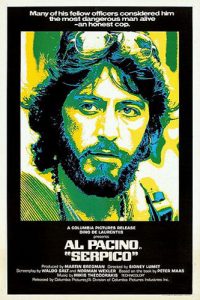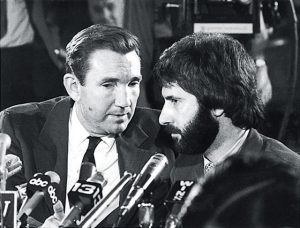Serpico sets the record straight, Part 7
Editor’s Note: Read the complete series on Frank Serpico under Special Reports.
Are you expecting an army?
So now Doug, one of the questions you asked me was did I have a Browning 9mm.
Yes, okay, the movie has that part correct. I went into a gun store behind headquarters. Jovino’s, I think it was called and I bought a fourteen round Browning 9mm semi-automatic pistol. In the movie the guy said, which the guy did say, are you expecting an army? I said no, just a division, meaning the 7th Division. That’s where I was working at the time.
I was the first cop in the New York City Police Department to carry a Browning 9mm. You couldn’t carry 9mm’s back then. They weren’t what you would call an authorized firearm. All we had was the .38 special.
When I was a cop I backed my guys up to the hilt. Sometimes I would feel bad because you sometimes don’t realize when you hit a guy. Anyone who came near my partners, you know, I’d do them in, I backed up my partners.
What the hell are you waiting for

Now, the night I got shot, I had my Browning in my belt. I had my .38 special Smith and Wesson snub nose in my pocket, in my fatigue jacket. I always had my hand in my pocket, if I had to use it. But on this occasion, you couldn’t see anything, I knew what I had to do. I had to get the door open and protect myself. So, the guy, Mambo, looked through the peephole. I told him I needed something in Spanish. He opened the door to make the buy. I said police! There was a chain on the door. I had my gun in my right hand. My arm was straight down so you couldn’t see it, from the peephole. I hit the door with my left shoulder and snapped the chain. As the door opened I jammed my shoulder, my foot and my arm into the apartment. I had the guy covered, but I couldn’t go any further because he was behind the door.
He had the leverage. That’s when I made the mistake to take my eye off the perp, to say to my partners, what the hell are you waiting for, give me a hand. When I turned back, boom, that was it, I got shot in the face.
My partners later said that they were waiting for a signal from me! You didn’t need a signal. Now Doug, I got one guy, he’s standing next to me, four feet away, watching the whole thing okay. He doesn’t see what’s going on? They were frozen like cigar store Indians.
The schmucks, they never called a signal 10-13, officer down. It was an old Hispanic man that called the cops. He stayed with me. My partners, I don’t know where the guys I was working with, where the hell they went, they were nowhere in sight.
Two cops responded, two cops in one patrol car. Now if it was a 10-13 that place should have been flooded with cops. Not only that, my partners should have taken me to the hospital themselves in their car.
When your partner gets shot in front of you, do you leave him there to bleed to death, or do you put him in your car and get him to the hospital ASAP?
They could have gone right into the apartment and picked up the phone, where the old man who made the phone call was. Everybody had a phone. I think one of the guys said he went somewhere. The other guy said he went to make a phone call. It’s bullshit, just cover-up that doesn’t sustain logic.
These two cops, I hear one of them say, I think he’s a narc. Now, a lot of people don’t know, that means undercover. Some people think it’s a narcotics deal or something. So anyway, I know one thing. Two cops took me to the hospital, all due speed, sirens blaring. They got me to Greenpoint Hospital.
See the thing is with these writers, they take liberties, what’s going to sound good. Peter Maas, he’s also got several inaccuracies in the book. Actors and directors, they have a responsibility when they are dealing with history that they tell the facts the way they are because people, they’re going to see it, like cops.
Just like Pacino in the movie. Either he did it on his own or he was directed to do it. You know, he’s got this big 9mm and he can’t get it into the door. That was so far removed from the truth.

Frank who shot the guy who shot you? You or the other cops?
You have these stupid guys, like they watch the movie and I saw where they got it from. They say, yeah, his buddies returned fire, shot the guy in the stomach. Oh, the guy got shot in the stomach and then he got away? It was pretty good. Didn’t happen that way.
I shot him in the hand. I say to everybody, I was like the Lone Ranger, just shoot the guy in the hand. The other thing is, his gun jammed otherwise he would have emptied that magazine into me. When he fired, I fired. I dropped my gun. He had time to pick up the gun and go out the back window. I wounded him. He left a blood trail, then went to another hideout.
What ended up happening I found out, there was this off-duty cop at home, Maxwell Katz. He heard that another cop had been shot and he came to the scene.
Doug get this, where talking about New York’s finest, the greatest detectives in the world, so to speak. You have a guy that just shot a cop. The charges against him were attempted murder of a police officer. That guy that just shot a cop. You have New York’s finest, the greatest detectives in the world. I repeat that intentionally.
They’re all going through the front door like a bunch of Keystone Cops. This one cop, Maxwell Katz, on his own, covered the back window, the back of the house. Mambo, the suspect is going out the back window again, just like he did the first time after I was shot. Katz shot him in the stomach with one round.
The bottom line is they never called for a 10-13.
Were you set up to be killed?
Frank in Mike McAlary’s book, Good Cop, Bad Cop he wrote that you said, Hey, the cops I worked with set me up to be killed.
Did you say that?
I never said that. I have never said that to anyone. I have never intimated that to anyone.
Do you believe that you were set up?
I’ve been asked that so many times. My answer was always, that’s not the question. The question was that they never called for a 10-13 and that to me was the bottom line. If they just left me there without calling a 10-13, they could have taken me in their own car to the hospital. It’s sort of a moot point.
I have said on occasion quoting [ Former NYPD Commissioner] Patrick Murphy and [Author James] Fyfe who said, “I don’t think Serpico was set up and I don’t believe Detective Serpico believes it either.” I did say well, why didn’t they ask me? They never asked me my opinion.
Doug when I confronted Murphy up here at Sienna College, his nephew’s college, I confronted him there and he ran away from me. He said we were out of time. I cut him off in the aisle and I said to him, do you know what a 10-13 is? He said sure that’s the first thing you learn. I said, where was my 10-13? Bottom line, end of story.
Murphy and Fyfe said, no I don’t believe he was set up. That’s conjecture.
The other thing is people give me more four-letter words than I’m responsible for. It’s like Pacino, he led the charge. I really didn’t use that word that much.
Frank in the book McAlary writes that you said, I remember this guy I worked with, Cooper, he told me after I got shot, ‘Yeah. I remember the night we had our meet to discuss getting rid of you.’ And I said, ‘What? We’re talking about another cop here.’ And he said, ‘No, Frank. We’re talking about our money here.’

Is that true?
Well the way he says it, its BS.
Doug, if I would have read that when he was alive I would have reamed him out. Cooper, I never knew a guy named Cooper, other than Chief Sid Cooper. He made that up. His name wasn’t Cooper. That was the stupidest thing McAlary could have done.
There was a plainclothes cop, who, I mean he was dirty, but he was good. You know, he just went along. He was a well-educated guy. He told me after I had gotten shot, when he heard that is when he knew, they’ve gone beyond. He said, they had a meeting to whether they should have me killed or not and he said to them, we’re talking about another cop here. They said to him, we’re talking about our money.
That is true.
The guy that told me that is deceased. His son had gotten ahold of me once because he found my telephone number. This cop was a well-educated guy like I said. He went to St. Johns College. He would always send me letters and penny postcards that he would type out, telling me how right I was and about the job. His name was not Cooper.
McAlary took a lot of liberties. I never read his book in total before talking to him. He had gotten into an accident and then he died. I spoke to him a couple of times and once I don’t know if he has it in the book or not. I think he wrote an article once. He said that he had talked to me and I live in this house with a little white picket fence and horses. I’m thinking, why do they have to make this stuff up.
I did an interview, I don’t know if it was 20/20, with Barbara Walters. She was talking to me about out-of-body experiences. She said that she was really fascinated about that. We got to talking and at one point she started to talk about my woman in Holland that I lived with. She had died at a very early age of cancer. I used to get very emotional when talking about it.
I don’t know if I told McAlary about it. I think he’s got it in his book to, which is another crock. He said in his book, and anybody that knows me knows that’s not me, when he writes that I said these fuckin cops, they’ll break your heart every time. I never said that.
Then he writes I was pretending to be talking about my woman in Holland. Now, McAlary, that’s why it makes you wonder when these guys write stuff. They take literary rights.
Editor’s Note: Read the complete series on Frank Serpico under Special Reports.

Doug authored over 135 articles on the October 1, 2017, Las Vegas Massacre, more than any other single journalist in the country. He investigates stories on corruption, law enforcement, and crime. Doug is a US Army Military Police Veteran, former police officer, deputy sheriff, and criminal investigator. Doug spent 20 years in the hotel/casino industry as an investigator and then as Director of Security and Surveillance. He also spent a short time with the US Dept. of Homeland Security, Transportation Security Administration. In 1986 Doug was awarded Criminal Investigator of the Year by the Loudoun County Sheriff’s Office in Virginia for his undercover work in narcotics enforcement. In 1991 and 1992 Doug testified in court that a sheriff’s office official and the county prosecutor withheld exculpatory evidence during the 1988 trial of a man accused of the attempted murder of his wife. Doug’s testimony led to a judge’s decision to order the release of the man from prison in 1992 and awarded him a new trial, in which he was later acquitted. As a result of Doug breaking the police “blue wall of silence,” he was fired by the county sheriff. His story was featured on Inside Edition, Current Affair and CBS News’ “Street Stories with Ed Bradley”. In 1992 after losing his job, at the request of the Federal Bureau of Investigation, Doug infiltrated a group of men who were plotting the kidnapping of a Dupont fortune heir and his wife. Doug has been a guest on national television and radio programs speaking on the stories he now writes as an investigative journalist. Catch Doug’s Podcast: @dougpoppa1
